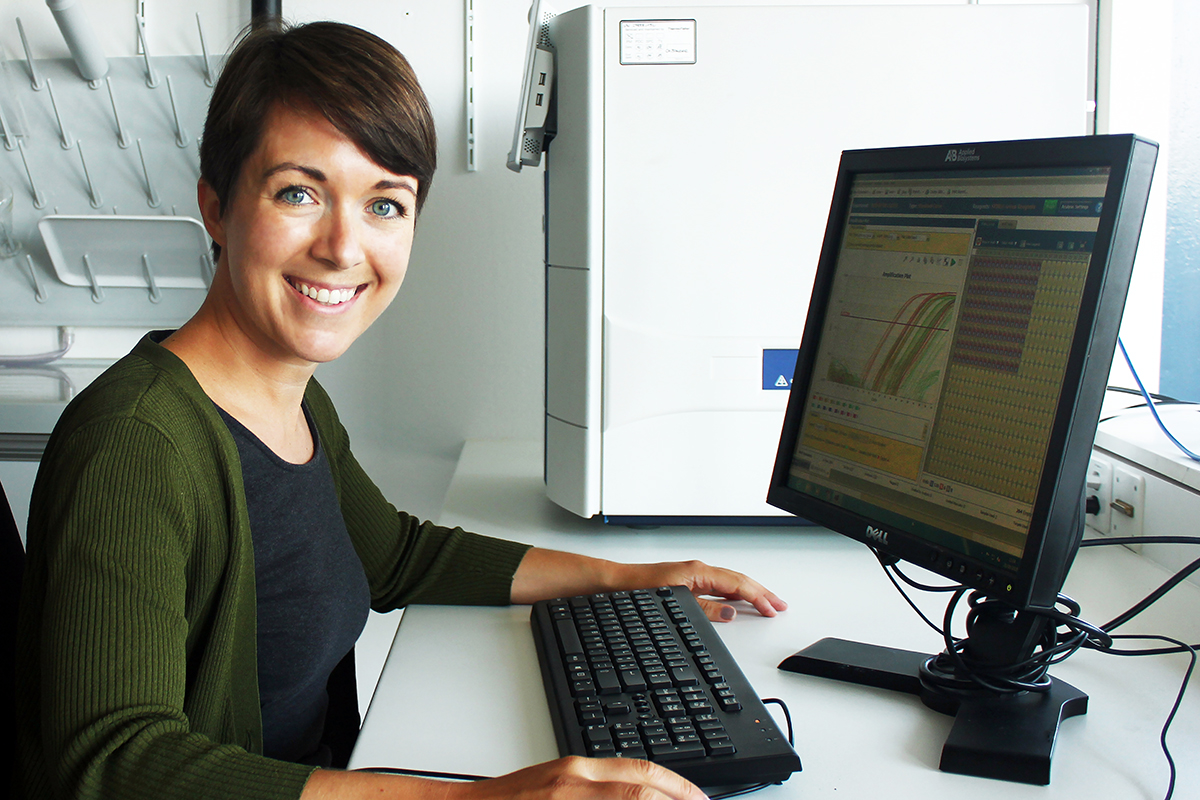"You have to take a step out of your research comfort zone"
Molecular biologist Kellie Cotter from the Department for BioMedical Research (DBMR) receives the 2018 Young Investigator Award. The Prostate Cancer Foundation (PCF) will support her research over three years with a total of 225,000 dollars.
"Uniaktuell": You have been awarded the Young Investigator Award, congratulations! What does the award mean to you personally?
Kellie Cotter: This award means a lot to me. Not only because of the financial support, but also because the award means an acknowledgement of the continuing importance of basic research in prostate cancer research. Furthermore, it is also a fantastic opportunity to interact and network with a group of leading scientists in the field of prostate cancer.

The PCF supports your research over three years. What does the award mean to you as a junior researcher?
One of the biggest challenges as a junior researcher is to get your first few grants or awards. At the beginning of a scientific career, you are more at risk because you are not as well-established as senior researchers, who can already refer to a long track-record. Because of this I am immensely grateful for the PCF Young Investigator program and its mission to support young scientists at this vulnerable stage in their careers. It is my hope that these three years of support will help me on my way to an independent position.
In your project you are going to investigate the molecular mechanisms of prostate cancer. Which aspect of your project did the PCF find particularly eligible for funding?
What really makes my project unique is that the field of epitranscriptomics is still relatively new. It investigates how RNAs can be biochemically modified without changing its underlying sequence and there is quite a bit we don’t know about the function of these RNA modifications. Additionally, while there have been some preliminary studies on other cancer types, it has yet to be examined in the context of prostate cancer.
What challenges do postdocs face? And what advice would you give to young researchers who want to pursue their research career?
I think the biggest challenges for postdocs today are related to funding and securing permanent independent positions. I would recommend young researchers to be open and flexible for many different project ideas and to use many opportunities for collaboration. I would tell them to take chances and also, to step outside of their research comfort zone. This is especially the case during the transition from Ph.D. to postdoc.
You work at the Rubin Lab at the Department for BioMedical Research DBMR. Why did you choose to realize your research project here in Bern?
The environment here in the Rubin Lab is ideal for my project. Our group has been involved in many large-scale, multi-institutional collaborations and has contributed to several of the more important recent advances in prostate cancer genomics. Further, working at the DMBR in Bern has allowed me to meet not only the other cancer researchers within the institute, but also scientists throughout Switzerland. Our participation in the National Centres of Competence in Research (NCCRs) "RNA & Disease", which is based at the University of Bern, plays a central role in this context.

Dr. Kellie Cotter
Born in 1986 in Buffalo, New York, USA
Kellie Cotter completed her bachelor’s of science degree in Biological Sciences at the State University of New York at Buffalo (USA) in 2008. In 2014 she completed her Ph.D. at Boston University (USA) in Molecular Biology, Cell Biology, and Biochemistry. For her Ph.D. thesis she was awarded the Science to Achieve Results (STAR) Graduate Fellowship from the United States Environmental Protection Agency. For her postdoctoral research she joined the lab of Prof. Mark Rubin at Weill Cornell Medicine in New York City (USA), and subsequently moved with the laboratory to Bern, where Mark Rubin was appointed Professor of Biomedical Research and Director of the DBMR in February 2017.
Project summary
Role of m6A methylation in post-transcriptional regulation and prostate cancer disease progression
The aim of the project is to investigate the frequency of a specific RNA modification (the m6A modification) in prostate cancer and its functional consequences for the progression of the disease. It is the first study to examine how prostate cancer utilizes this alternative molecular mechanism to regulate gene and protein expression. It provides valuable fundamental research that contributes to a better understanding of the molecular functioning of prostate cancer. It also has the potential to identify possible novel biomarkers and/or therapeutic targets and therefore will be of significant benefit to patients.
Publication:Kellie Cotter, Mark A. Rubin: Sequence of events in prostate cancer, in: Nature 560, 557-559 (2018), doi: 10.1038/d41586-018-06029-5 |
Contact:
Dr. Kellie Cotter
Department for BioMedical Research (DBMR), University of Bern
Phone: +41 31 632 98 42
E-Mail: kellie.cotter@dbmr.unibe.ch